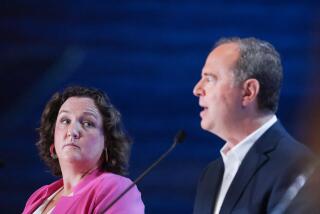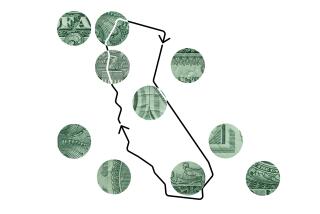Political money needs a tighter rein
SACRAMENTO — In politics, there’s sleaze that can send a slimeball to prison. There also is legal bribery. Lots of it.
“Campaign contributions provide a fig leaf for legalized bribery,” says campaign finance expert Robert Stern, who helped write California’s political reform act four decades ago.
“Ninety percent of campaign money comes from people who want something from government. And often they get it. Nobody gives campaign money to incumbents who have no real [reelection] competitors without thinking they’re getting something in return. Nobody wastes their money.”
Legal campaign donations, however, do not equate to sleaze.
Putrid sleaze is what state Sen. Ronald S. Calderon (D-Montebello) is alleged to have wallowed in during an elaborate FBI sting, according to a federal affidavit disclosed last week by the Al Jazeera America cable network. In the affidavit, the FBI alleged that Calderon took $88,000 in bribes, most of it from undercover agents.
Calderon has not been charged with any crimes and, through his attorney, has denied wrongdoing.
Nevertheless, Senate leader Darrell Steinberg (D-Sacramento) did the right thing Wednesday. He took steps to remove Calderon from his Senate committee assignments, including chairmanship of the coveted Insurance Committee, a “juice” panel that attracts generous campaign donations.
The allegations against Calderon “cloud any interactions the senator might have with colleagues, [lobbyists] and the public,” Steinberg said, calling the accusations “the most serious breach of the public trust.”
True. And I’m not saying that legal bribery is as odorous as smelly sleaze. But it does tend to emit a stench.
Campaign money actually gets a bad rap, to one degree. It costs a fair amount to run a competitive race.
If the public is unwilling to finance the campaigns of state politicians — and public financing has become impractical anyway, because of U.S. Supreme Court rulings — then the political funds must come from some other source. A very wealthy candidate might be willing to finance his own campaign, but normally the funding is supplied by favor-seeking special interests.
One problem, however, is that money in a campaign account doesn’t have to be spent on running for office. It also can be spent on goodies — such as four-star dinners and boondoggle trips — as long as it “reasonably” relates to a legislative or governmental purpose. For example: educating oneself on high-speed rail in Japan or the wine industry in France.
So campaign contributions can significantly enhance a politician’s lifestyle.
And a campaign fund is only one of several pots that special interests can fill to ingratiate themselves to officeholders.
There are “officeholder” accounts, which are especially important to incumbents who are not seeking reelection and are therefore barred from raising campaign money. Unless, as many do, they create a phony account ostensibly to run for another office.
They can dip into those officeholder pots for so-called legislative and governmental purposes — taking the staff to Morton’s for a dinner meeting, for instance, on the special interests’ dime.
Business execs dine lavishly, of course, but the company pays.
I’d require all legislative junkets to be paid for by the company — the government. If an officeholder’s fancy meal or trip truly has a governmental purpose, it ought to be paid for by the taxpayers. And if it can’t be justified, then it shouldn’t happen.
“You and maybe 5% of the people think the public should pay,” Stern says. So the special interests gladly do.
The interests — labor, business, casinos — also donate to politicians’ pet charities in their names. Those contributions are called “behested payments.” It’s a three-fer: the interests curry favor with the politicians, they earn tax write-offs and — probably their last concern — they help the charity.
Behested payments only need to be officially reported if they exceed $5,000 per year from a single interest. Even so, $2.3 million has been reported in the names of legislators this year.
And roughly $3 million has been reported on behalf of Gov. Jerry Brown, practically all of it for two charter schools he created in Oakland while mayor.
Legislators can also solicit special interest money for a legal defense fund. In case they get snagged in a sting. Unlike a campaign fund — for which there’s a $4,100 contribution limit per election, or $8,200 total for the primary and general — there’s no donation cap for a legal kitty.
“There’s a common thread that ties every single one of these” pots, says Dan Schnur, director of the Jesse M. Unruh Institute of Politics at USC and a former chairman of the state Fair Political Practices Commission. “That thread is a Capitol culture that is overwhelmingly focused on fundraising.”
A culture of hitting up special interests practically 24/7.
Schnur would ban fundraising while the Legislature is in session. “This would give legislators back five or six hours a day to do the job they were elected to do,” he says.
Steinberg won’t go that far. But the Senate leader says he does intend to introduce legislation to limit the amount of money that can be raised in a non-election year. “Probably $50,000.”
That would help a little. But I’d also limit what the money could be spent on — no gourmet dinners, no boondoggle trips.
The Legislature will never do that. It’ll require some moneybag reformer to finance a ballot initiative.
Meanwhile, spare me the spin from politicians that they aren’t influenced by any of these special interest investments. That’s like saying a dog isn’t influenced by petting.
More to Read
Start your day right
Sign up for Essential California for news, features and recommendations from the L.A. Times and beyond in your inbox six days a week.
You may occasionally receive promotional content from the Los Angeles Times.







